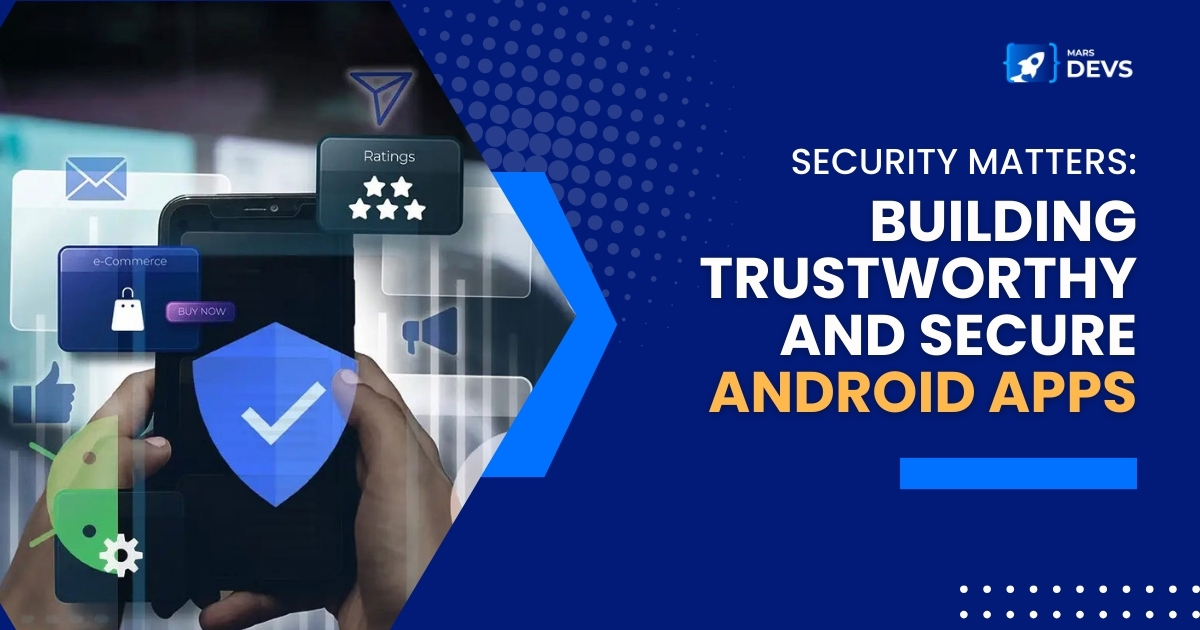Security Matters: Building Trustworthy and Secure Android Apps
Security and data privacy issues are the main concern for users in the modern digital era. As mobile applications are continuously gaining popularity, it is important to make sure Android apps are reliable and secure. Maintain user privacy, establish credibility, and abide by the law to provide a safe and satisfying experience.
In this post, we'll examine the importance of security in app development and offer crucial advice for creating reliable and safe Android apps.
Why Is Security Important?
Due to the increasing rate of cyber-attacks and the increased reliance on technology for governmental, commercial, and personal purposes, security is crucial in today's digital world. Secure data protection, privacy preservation, and eliminating cyberattacks such as malware, phishing, and hacking attempts depend on effective security measures.
Security ensures confidentiality and privacy in online interactions and transactions while assisting people in protecting their data against fraud and identity theft. Security is essential for firms to follow industry rules and data protection regulations, preserve intellectual property and digital assets, and guarantee operational continuity.
Furthermore, by displaying a dedication to protecting users' interests and privacy rights, security builds confidence and trust among stakeholders, consumers, and users.
Security Key Components
Keep data and app secure, some key components are there to keep your app secure!
Data security can prevent unwanted access, disclosure, alteration, and destruction of private user information.
Application security is preventing flaws that can let hackers access private information or impair an application's operation.
Validating and cleaning user input is vital in preventing injection-based attacks such as SQL injection and cross-site scripting (XSS).
Encrypting network communication and shielding data from eavesdropping may be achieved by using secure protocols such as HTTPS and TLS.
Secure Storage by keeping private data, such as encryption keys and passwords, in safe places using tools like Keystore.
Threat Attacks For Android Apps
Malware is the term for malicious software that may infect devices without authorization, steal user data, or spy on users. There are now a lot more malicious programs in app marketplaces.
Phishing attacks are made with apps designed to trick people into disclosing private information, such as credit card numbers or login passwords. Phishing is still a popular method of attack.
Supply Chain Attacks include hackers targeting third-party software dependencies and SDKs used during development to introduce malware or vulnerabilities into trustworthy applications.
Targeted Mobile Threats have malware designed to target particular individuals or groups; it employs various attack methods, such as phishing URLs. Targeted mobile threats are a common tool used by state-sponsored organizations.
How To Build A Secure And Trustworthy App?
Implement Secure Authentication: To securely verify users' identities, implement robust authentication techniques like multi-factor authentication (MFA) or biometric authentication.
Developers may improve overall app security by preventing unwanted access to vital user accounts and data by implementing strong authentication procedures.
Encrypt Data transfer: To safeguard user privacy and stop malicious people from intercepting or listening in on private conversations, it is essential to encrypt data transfer between the application and servers using secure protocols like HTTPS. Developers can guarantee the confidentiality and security of data transferred via unreliable networks by using encryption methods.
Secure Data Storage: Encrypting sensitive data locally stored on the device is crucial to safeguarding user privacy. By giving developers tools to securely store cryptographic keys and sensitive data, Android's built-in security features—like the Android Keystore—lower the chance of data breaches and unauthorized access.
Security against injections: Enforce least privilege rules, use strict input validation, escape special characters, and strengthen against injections such as SQL or code injection. Utilize stored processes, cleanse input, do regular audits, and offer security awareness training to reduce risks and guard against illegal access and data breaches.
Secure communication between apps: To safeguard data integrity & confidentiality, secure communication between apps, usage of encryption, authentication & authorization protocols like OAuth, TLS/SSL & secure APIs are vital. To prevent unwanted access & provide strong security, data validation & certificate pinning storage techniques are used. Finding vulnerabilities requires routine monitoring and audits.
Security Updates: Ensuring the security of Android apps requires keeping up with new security threats and vulnerabilities. To address known vulnerabilities and reduce the possibility of exploitation by unwanted people, developers should update their apps regularly with the most recent security updates and fixes.
Regular penetration tests and code audits can also assist in finding security flaws and fixing them before they are used against you.
User Permissions: Gaining users' confidence and transparency may be achieved by asking for their permissions only when necessary and explaining each request. By limiting the amount of sensitive data collected and following the least privileged principle, one may improve user security and privacy by lowering the danger of data disclosure and misuse.
Safe Third-Party Integrations: If third-party libraries and software development kits (SDKs) are not thoroughly screened, they may present security vulnerabilities. Before incorporating third-party components into their apps, developers should carefully assess them for security flaws and compliance with security best practices.
Keeping an eye out for security warnings and routinely patching third-party dependencies will help reduce the chance that bad actors will take advantage of your system.
Wrapping Up
The security of Android applications plays a vital role in a world where connectivity and data are becoming extremely important. By implementing strong security measures and prioritization of security in app development, developers may safeguard user privacy, reduce security threats, and foster confidence and trust among their users.
Developers may produce safe and reliable Android apps that put user privacy and protection first by following legal requirements, implementing industry best practices, and maintaining awareness against new risks.
App creators can protect user data and provide a secure and pleasant user experience by investing in security. Are you looking to know more about securing Android apps? Grab a free 15-minute call with us today.







Comments
Post a Comment